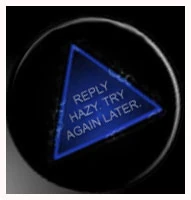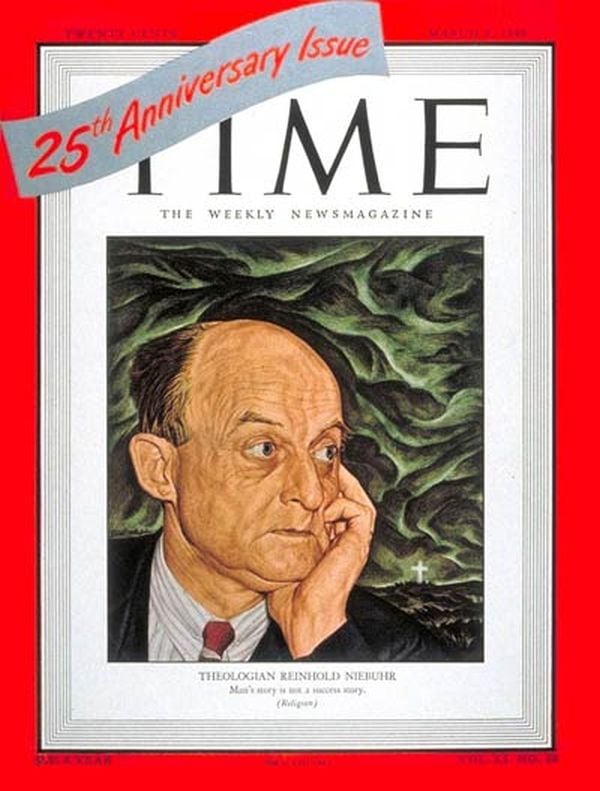Has there ever been a "religious left" in America?
Reinhold Niebuhr is the closest thing to a public theologian we've ever had in America who wasn't either promoting Aristotle's old wine ethics in new wineskins (Norman Vincent Peale) or tub-thumping to save souls (I probably shouldn't even include Billy Sunday or Billy Graham as "theologians" alongside Niebuhr, simply because it's a category error). Niebuhr at least made the cover of TIME magazine (then again, so did Billy Graham; but Niebuhr didn't do it for preaching to football stadia full of people (attended one of those in my youth)). Maybe it was 1948, and a different time. In the early 20th century Biblical scholarship was so popular people were buying Greek lessons by mail order so they could read the scriptures themselves in the original tongues (well, the New Testament, anyway, although they could have read the Septuagint, too). As well, publicly attested religious faith was at it's lowest point in 1914; that kind of attitude leaves a mark, even 34 years later. Of course, after the second World War American prosperity blossomed, and with it the rise of safe, placid, God-with-us in this land flowing with milk and money suburban Christianity.*
Niebuhr was never a theologian for suburban Christians. But neither was he a restless firebrand, even though he pastored working class people in Detroit in the '20's. He was a powerfully influential figure, though his most all known book was actually a very conservative challenge to more "liberal" theologians of his day. His brother Richard, undoubtedly the better scholar and theologian, despaired to "Reinie" that if
Moral Man and Immoral Society was right in its thesis, then there wasn't a lot of hope for humanity's improvement (which was still the quest of religious belief in most American circles).
Still, few conservative or evangelical Christians in America today would take much comfort in Niebuhr's analyses of human history, culture or nature. He wasn't speaking to them, either.
He did speak to Martin Luther King, Jr., who greatly admired Niebuhr's work, and was strongly influenced by it. Not surprising, since Niebuhr's thought is fundamentally practical (and about praxis), and King was a very practical preacher and religious leader (and equally invested in the importance of praxis). To even mention King in this context is to invite danger: we first have to get King off the unicycle of "a dream" that we have put him on, and recognize King was the public face of the civil rights movement, and the leader of the SCLC effort (but not the only person or group seeking equality under the law at long last; Malcolm X is one counterpoint, and his views, too, were grounded in religious belief. Another would be Muhammed Ali, who doesn't get the credit yet that he deserves.)
But King didn't lead a "religious left" movement. When he finally turned against the Vietnam War, a distinctly leftist position in 1967, he was abandoned by many "liberals" who had been with him to that point. He'd stopped preaching and gone to meddling, as the hoary cliche has it. He had already shattered the myth of a "religious left" in his famous "Letter from Birmingham Jail," a letter condemning Christian churches (and Jewish synagogues) because they would not openly and publicly support his civil rights movement. King's movement was supported by black churches, but those churches had a vested interest in the outcome: equality under the law for their members. The churches King assailed had a vested interest in the status quo, as he pointed out to them. Pastors who stood outside that status quo, or challenged it, could find themselves without a pulpit. Religious figures who did challenge the way things were, being against war or for civil rights, by and large had no institutional ties, or none that could be threatened. They also didn't have much effect. King's movement was a religious movement, for him and the group he represented, but it was a secular one for many of the people who eventually came to march with him, and to this day we honor King as a secular saint for his "dream," rather than regard him as a prophet in the Hebraic tradition (an honor he deserves but seldom gets).
I suppose you can find "leftist" religious influence in American culture. Prison reform and the idea of rehabilitation rather than simply warehousing, is a product of Quaker thought (I think solitary confinement is, too, though I'm open to correction on that. Good with the bad, as usual). The "social gospel" was meant to be a way of understanding systemic problems of poverty in America, and not deciding the poor would always be with us, so there's nothing we can do (it was the perfectionism of the social gospel Niebuhr savaged, not the concern for the poor). But a religious left to counter the religious right?
Well, first, the old joke is true: the religious right is neither. One of its most public promoters was Ralph Reed, a man who escaped jail by the skin of his teeth, and who could give Elmer Gantry lessons in hypocrisy and shamelessness. The religious right today stalwartly supports Donald Trump despite the fact the man has led a life that would have been used to fuel a whole series of fire-and-brimstone sermons about the evils of the world and the path of the Devil to perdition, with Trump as the poster child for what God-fearing Christians should
not do. It's almost not a judgment to say they are blatantly hypocritical; it almost qualifies as a mere fact. But are they so monolithic and powerful as to have a stranglehold on national politics?
I think it's without question that they have a stranglehold on the public discourse about religion. Dr. King is not remembered as a religious figure, which makes him safe for public consumption. Jim Wallis is either widely ignored or even more widely unknown (my wife would probably recognize his name, but that's because I was intrigued by Sojourners about 40 years ago. I doubt I could find many people I know even casually who have heard of him.) He's more likely to be castigated for his "conservative" attitudes than praised for his more liberal ones; and as a religious thinker, he's really quite conservative. Does that play into the discussion at all?
The Berrigan Brothers were quite liberal in their politics, but their allegiance to the Church of Rome never seemed to bother anyone. Today that might well be a stumbling block for many, especially on the left. Many Christians are presumed by the media to be evangelicals or at least very conservative in their politics. Non-evangelical Christians are either silenced by being ignored, or tagged as "liberal" and therefore a minority in circles of public thought; and by and large, they are.
I started this there, and it stalled. Then Pastor Dan
posted his follow-up, and I found that ministry has made him a more cynical and jaded soul. Or just more aware, as my favorite seminary professor put it, that "life is messy." And you sure as heck aren't in charge; you're just responsible.
Yeah, dwell on that a minute. Then consider what Pastor Dan adds:
In sum, I’d probably say something like this: the religious left is chasing a phantom. Its leadership appears to believe that if it can project just the right faith-rooted message with just the right messenger or messengers, the broad middle of Americans who only want to do the right thing can be reconciled across racial and political lines. This will then somehow usher in a new progressive era of peace and justice.
I've made this same argument myself, in different contexts. People really don't want to be told what to do, and are not empty vessels waiting for you to fill them up, or standing about in blank anticipation of the revelation of your wisdom. They pretty much know what they think and, as Pastor Dan says a bit later (I'm sure I'll quote it in a minute) and just want that confirmed.
In a word, the religious left is extremely, politically, naive.
Well, duh.
Listen, the fight for a more “moral politics” never was going to be a success. Saying “I’m not a ____, I’m a Christian” is trying to have your cake and eat it too. Politics cannot be so easily transcended, as any student of Augustine or Niebuhr understands.
Yup; Niebuhr again. Hard to get past his take on reality and ethics and Christianity.
Rallying cries summoning believers to “battle for the soul of the nation” aren’t much help either. Our nation doesn’t have a soul. It has a moral narrative if anything, and that a contested one. Even to the extent that America can be said to have a soul, that thing is a dark, twisted and brutal thing. Hasn’t anyone ever read Moby Dick? The Fire Next Time? People don’t want to redeem the “soul” of the nation. They don’t even want to do the right thing, half the time. What they want is for their ethics to be normative. Let’s be honest about that.
The first part of that is Niebuhr's thesis in
Moral Man. The latter, as promised, is what people want; and they don't want to hear something new and challenging from you. They may be the light of the world, but you aren't. Remember that, it will save you a lot of trouble. And sorry, I can't resist quoting even more:
It isn’t a “deeper” politics rooted in a “fuller” understanding of the gospel. The number of scripture verses you can quote doesn’t matter a bit. Nor does how many more of those verses speak of social justice than sexual ethics. It does not matter how “prophetic” people are. Nor does it matter how spirituality informs one’s politics. We live in a secular and hyper-partisan age. These things motivate almost no one.
Another lesson from seminary; actually from experienced pastors seeing us dewy eyed and freshly doused in our seminary learning: "They don't care how much you know, until they know how much you care!" In the rhetoric of argument, it's Aristotle's four elements: Ethos, Logos, Pathos, and Kairos. Logos is the reasoning of your argument; how "prophetic" you are, in Dan's words; or how many verses you know. But that, as Aristotle pointed out, is useless without Pathos, getting your audience to understand you empathize with them (rather than, as is more usual, trying to get them to empathize with you). Ethos also goes to the speaker, not the logic; if they like you, think you are worthy, they listen. If not, your logos is a clanging gong and a sounding cymbal. They don't care how much you know until they know how much you care. And if all you care about is how much they should know, you aren't getting very far. We've known this for several thousand years, yet it still is news.
And this, quoted from Twitter, which echoes my statement about the Religious Right:
“Religious left” is an oxymoron (this spoken by secular leftists and religious conservatives alike).
Yeah, let's stop and argue about "religious" awhile! That's always productive! But raise the issue and try to avoid the arguments it implies. I'll hold your coat over here.
Remembering my one-sided arguments with Pastor Dan over the years, it's almost sad to read a realization like this:
In reflecting on this question, I’ve come to the realization that I don’t actually care much about the institutional religious left. To be sure, there’s room for organizations that try to develop the political identities of religious voters and represent them in Washington. But those groups are effectively irrelevant to what’s actually happening in the political world, or close to it. My God, the roadbuilders’ association leads the Wisconsin state government around by the nose. Meanwhile, nobody’s paid attention to a clergy protest here in decades. So no, I don’t really find much to care about in the religious left, as it is.
Yup. The UCC, bless its institutional heart, regularly releases earnest press releases which no one pays any attention to, including most of the people in UCC pews. But here is where I would counsel him to be careful what he wishes for:
What I do care about is religious liberals or leftists who are willing to use power. Moral suasion does nothing. Anybody who’s ever watched Paul Ryan penitently bite his lip, then pledge to burn another piece of the social safety net to the ground ought to understand that. Raising money for the opponents of miscreant politicians just might change their course, though.
I don't find a lot of support for gaining and using political power in the scriptures, frankly. God warns Israel against any government structure more complex than the judges who basically act as tribal elders. Not that Israel could continue as a series of confederated tribes, but there's really not much in the entire Bible that says political power is good and you should have some. There are reasons for this,
as I've said before. My sympathies are more with the Dorothy Days of the world than the LBJ's, anyway. And I'm not sure what the church, right or left, had to do with his political career, anyway. God moves in mysterious ways, and all that.
Pastor Dan goes on to advocate small groups forming around the country, working on local issues. He writes as if this isn't happening, although I know from my brief career in ministry that it is. It may be under his radar, or he may not think much of the efforts of those groups already established, but it's already there. Maybe it's just not politically active enough for him; I just don't hold a belief in the efficacy of power that he does, so, as I say, this is where we always part company. He closes with a reference to the parable of the sower, and says maybe we should trust God (faith!) to make the seeds grow that we scatter:
What if people spent less time trying to developing a religious left, the religious left, and focused instead on letting religious lefts and leftists blossom, trusting that God would increase their efforts thirty or sixty or a hundredfold? Some people won’t get it, of course, and some people will reject it, while others won’t be able to act on it. But those who do might just be able to change the world.
"Those who do" being the ones Rev. Schultz agrees with, of course; there's that power thing again. Who am I to judge, I have to ask? He appends a not about making "Christian" a normative of the conversation in a world with Jews, Muslims, Buddhists, and secularists. But then he thinks his leftist politics should be normative because, well, that's what he agrees with. And there's the messy again: if you want to take a stand and say, in any way, that God is with us, you are already taking a stand against, as well. "Some won't get it...and some people will reject it, while others won't be able to act on it." Kind of depends on what you expect them to "get" and how they should "act on it," doesn't it? And in the
basilea tou theou where the first are last and the last first, maybe I should seek to 'change the world' by living as if that were true, and the kingdom of God were right here, right now.
Even if I can't get anybody else to go along with me on that. Oh, wouldn't that be a headache! Or lovely, depending on your point of view.
*and how important is Niebuhr, in certain circles. Note this last sentence in another RD article about the passing of Ainslie Embree:
Like Niebuhr, Embree was a realist in seeing that the “sublime madness” of the religious vision could be not only an inspiration for greatness but also a tool for venal political aspirations.
That's the only time Niebuhr's name appears. I'm not sure the sentiment about politics is such an original observation, but attaching a name to it gives it authority; especially the "right" name.














